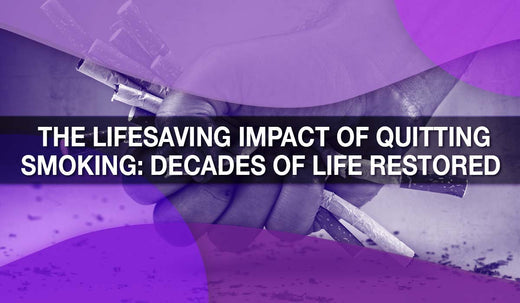
The Lifesaving Impact of Quitting Smoking: Decades of Life Restored
Smoking is the leading preventable cause of death worldwide, with devastating consequences for individuals and public health systems alike. A groundbreaking study, published in the New England Journal of Medicine and available on PubMed, provides a stark reminder of smoking's toll: smokers lose at least a decade of life expectancy compared to those who have never smoked.
However, the study also delivers a message of hope: quitting smoking, even later in life, can dramatically improve life expectancy and reduce the risks associated with continued smoking.
Smoking's Toll: A Decade Lost
For smokers, the consequences are dire. The study reveals that:
-
Smokers, on average, lose at least 10 years of life expectancy compared to nonsmokers.
-
Smoking is linked to a significantly increased risk of death from numerous causes, including cancer, heart disease, stroke, and respiratory illnesses.
This stark reality underscores the urgent need for smokers to quit as early as possible to minimize the damage caused by tobacco use.
The Power of Quitting: Adding Years to Life
The study offers compelling evidence of the health benefits of quitting smoking at various ages:
- Quitting by age 40: Reduces the risk of death associated with continued smoking by an astounding 90%.
- Quitting between 45 and 54: Adds approximately 6 years of life expectancy compared to continuing to smoke.
- Quitting between 55 and 64: Adds about 4 years of life expectancy—even at this later stage in life, the benefits of quitting are substantial.
These findings make it clear: it is never too late to quit smoking. Each additional year without cigarettes contributes to better health and greater longevity.

Risk Reduction: A Significant Impact
Even smokers who quit later in life see significant reductions in their risk of death:
-
Smokers who quit between the ages of 45 and 54 reduce their excess risk of death by about two-thirds.
-
Those who quit between the ages of 55 and 64 still experience a meaningful decrease in risk.
These statistics highlight the extraordinary potential of smoking cessation to reverse the damage caused by tobacco use, even after decades of smoking.
The Role of Harm Reduction and Support
While quitting smoking outright is the ideal goal, many smokers struggle with quitting for good. Harm reduction strategies, such as nicotine replacement therapies, vaping, or nicotine pouches, can play a critical role in helping smokers transition away from combustible cigarettes.
For those unable to quit immediately, these alternatives can provide a pathway to cessation while reducing exposure to the harmful chemicals produced by burning tobacco.
In addition to harm reduction, access to counseling, support groups, and prescription medications can greatly increase the chances of quitting successfully.
A Call to Action: The Benefits Are Clear
The findings from this classic study serve as both a warning and a beacon of hope. While smoking exacts a steep toll on life expectancy, quitting smoking—at any age—can add years to life and dramatically improve quality of life.
For policymakers and public health advocates, these results reinforce the importance of continued efforts to reduce smoking rates through education, regulation, and access to cessation resources.
For individuals who smoke, the message is simple: quit as soon as you can, and don’t give up. Whether you’re 30, 50, or even 65, every cigarette you don’t smoke matters, and every year smoke-free contributes to a healthier, longer life.
Quitting smoking is one of the most impactful decisions anyone can make for their health. Smokers who quit by age 40 reduce their risk of death by 90%, and even those who quit later in life gain years of life expectancy.
The evidence is clear: no matter how long you’ve smoked, it’s never too late to quit. Every step toward a smoke-free life is a step toward a healthier, longer future.
For more details on this pivotal study, visit PubMed.









Leave a comment
This site is protected by hCaptcha and the hCaptcha Privacy Policy and Terms of Service apply.